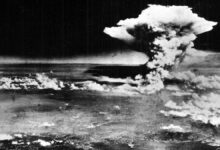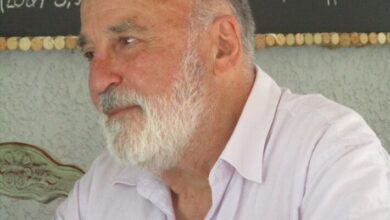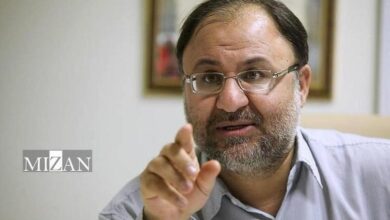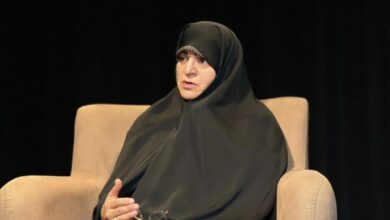Beuze: The situation in Yemen is really a dire one
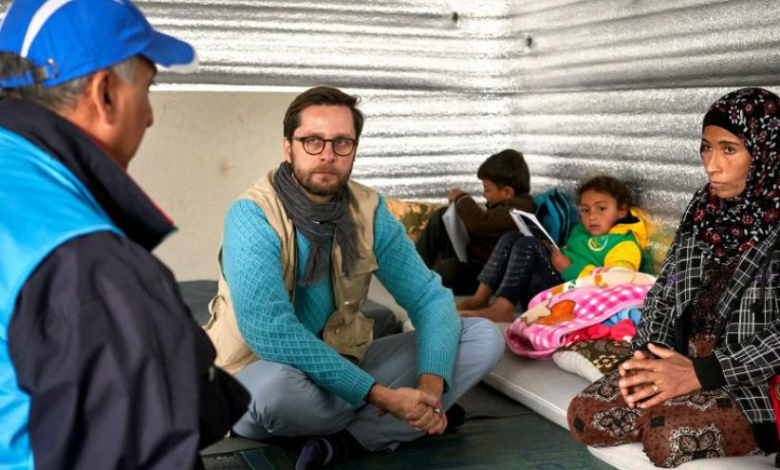
Association for Defending Victims of Terrorism – Melissa Fleming is the United Nations’ Under-Secretary-General for Global Communications as of 1 September 2019.
She interviewd, in March 2021, with Jean-Nicolas Beuze, Representative of the UN Refugee Agency in Yemen. Beuze discusses the disparity between the Western world’s outlook and the harsh realities most of the Yemeni people face “The Western world worries about the Coronavirus.
Here is some transcript of that interview.
Melissa Fleming:
From the United Nations, I’m Melissa Fleming, and this is Awake at Night. Today, my guest is Jean-Nicolas Beuze, the Representative of the UN Refugee Agency, UNHCR, in Yemen. Jean-Nicolas, you have worked in crisis-hit areas around the world and let me name just a few: Syria, Sudan, Libya, Afghanistan. But before we hear about that, I’d like to ask you now, how is the situation in Yemen where you are now?
Jean-Nicolas Beuze:
The situation in Yemen is really a dire one. It’s one of the worst I’ve experienced and, as you mentioned, I’ve worked in pretty tough places. Here, the situation is quite desperate. We have probably two thirds of the population which relies on our humanitarian assistance for their daily survival. We have half of the health facilities that have been destroyed by five years of the conflict. We have one person out of eight which has been displaced by the conflict. And the result of all that — on top of the coronavirus, which is not even the main concern in terms of communicable disease, because we have cholera, we have malaria, we have chikungunya, we have dengue fever.
So, it’s a combination of all those factors that means people are barely keeping their head above the water. And I see that on a daily basis when I go and meet families which have been displaced by the conflict.
Melissa Fleming:
Is there one story that you can recall recently that really just stayed with you?
Jean-Nicolas Beuze:
We visited a collective shelter in Hudaydah, which is one of the main frontlines. I was doing the visit, playing a bit with the kids, asking questions to the parents and in the corner there was a woman who had a beautiful dress with an African print. But her face had something a bit bizarre. She had been entirely burned by an explosion, a bomb which had dropped next to her. She was going to the market to buy food for kids and her entire body, as she said, went on fire. This is the kind of image which stays with you for a while. Because that’s why I’ve chosen to work in this field. It’s for that kind of woman.
Melissa Fleming
So you couldn’t see the burns on her body but you could see the pain in her eyes?
Jean-Nicolas Beuze
And the burn on her face and the fact that her whole demeanor was so…There was something extremely elegant and dignified about the way she was interacting with me. She didn’t beg for anything. She was not appealing for help. She probably knew that there was very little we could really do, except perhaps help a bit with some cash assistance to give a bit more comfort. But at the core, there was really nothing we can do for her. She would probably need treatment in another country, because the medical facilities here will never have that kind of expertise in it. She was not asking for anything.
Melissa Fleming
This war has gone on for years and years with so much suffering. Was she a bit resigned to her suffering?
Jean-Nicolas Beuze
She was resigned to her suffering. She was, like any mother in the world, concerned more about the survival of her kids. She was a widow.
Melissa Fleming
You spend your days going out to see people who are displaced by this conflict, displaced internally. I know that you’re also responsible for the refugee population, people who have actually fled to Yemen and have sought safety there. But now, given this horrific humanitarian situation, just describe what a living situation is like for the average Yemeni these days.
Jean-Nicolas Beuze
The situation now of refugees specifically in Yemen is one of discrimination, of scapegoating. It was quite worrisome at the beginning of the pandemic to see that, despite the fact that refugee communities have been relatively well integrated. We are speaking about Somali refugees in Yemen who have been there for decades. Suddenly, the Yemeni needed to find an explanation for COVID-19 or a scapegoat. So, they pointed fingers at the refugees. It was also combined with racism, darker skin, coming from Africa.
Allegations that they were not as healthy and focused on hygiene as the Yemeni population. And it’s true that there was something also related to the migratory status of the people. The fact that those people were on the move. And we saw that also with the Yemeni IDPs being displaced. So, there was this perception by the general population, an intuition that if, if the COVID has come to my community, to my village or to my neighborhood, it’s because somebody brought it in. And then of course, people who are on the move, whether it’s refugees or Yemeni families displaced by the conflict, are the perfect scapegoat.
Melissa Fleming
It must be just unimaginable for most people to think about living in a conflict zone, living in a country where there has been a horrific war, a destructive war, a deadly war, for so many years, and then compounded by a pandemic. For those who had to leave their homes and are living in precarious situations, can you just describe one of those living situations?
Jean-Nicolas Beuze
So, most people will live in one room with probably an extended family. Two or three generation, cousins who have found refuge in the same place because people can simply not pay rent. So, you gather everybody in the same room. The room is used for breakfast and lunch. There’s often no dinner because they don’t have enough to buy food. It’s the same place where they cook and it’s the same place where they sleep. So, for them, it was also very interesting to engage with them on what it means to take preventative measures against a COVID-19?
No, you cannot have two metres apart from a family member who may show symptoms because it’s only one room. No, you cannot wash your hands regularly because there is no tap water and the children of the woman will have to go five kilometres away to get some water. No, you don’t wash your hands because between buying a bit of rice and soap, you choose the rice. And no, you don’t stop going out to beg on the street or to have one of those daily meagre wages from daily work because the money you get in the morning is the money which allows you to buy lunch.
It was fascinating how even the UN was obsessed about saying you need to empower people to take the preventative measure and I was like, ‘Come on. Let’s wait a minute. This is not realistic for any of the people I meet.’ Yes, the Western world worries about the coronavirus. Yemen cannot even afford to worry about the coronavirus because we have malaria, chikungunya, cholera and dengue fever. All that. Plus, there is a famine.
Melissa Fleming
Wow. It’s hard to imagine all of those threats and the last one you mentioned is probably one of the most devastating of all, the most devastating, the threat of famine. Are you seeing signs of it being there now or impending?
Jean-Nicolas Beuze
Yes, we see it in the clinic, in particular for the refugee community. I met a little girl — Fatima, 14 months old, and she weighed five kilos. She should have weighed 10 kilos at her age, 14 months, and she was really in severe malnutrition. And it was really sad because the father was really explaining that the little girl, Fatima, was not keeping any food, she had diarrhoea, and even the meals that the mother was giving — it was very difficult for him to understand, or maybe he had blocked the fact that his child was malnourished.
Melissa Fleming
Jean-Nicolas, just before moving to Yemen to serve as UNHCR Representative, you were based in Canada, where you had probably a very safe life with lots of freedom of movement. I want to understand: why do you choose a place like Yemen as your next posting, which is just so difficult in so many ways? It’s dangerous. It’s devastating. There’s so much suffering around. What is it about you that chooses to go to places that are so challenging and difficult?
Jean-Nicolas Beuze
First, I think it’s really the curiosity. I think I’m somebody very curious about others, about different ways of looking at life. So, a country like Yemen is fascinating because it has everything. It has this tribal dimension. It’s a very ancient culture. It’s a beautiful country in terms of the setting; the sea, the mountains, the desert, so I was very attracted by that. I think there is also something more personal.
I look for challenges. I’m not interested in jobs or functions that I can do with my eyes closed. I get very impatient very quickly, I have no patience whatsoever. And I get bored very quickly. So, I want those challenges. I want to be confronted with a difficult situation, difficult choice to make for my organization, for my colleagues, for the people we serve. That’s what drives me.
I’ve been to Afghanistan. I’ve been to Congo during the war. I’ve been to Libya during the NATO bombing.
Melissa Fleming
You are such an empathetic person. That’s the quality really most needed when serving refugees. Why the cause of refugees for you? Why did you choose this cause — refugees and forcibly displaced people, people who’ve been forced to flee their homes because of conflict?
Jean-Nicolas Beuze
My whole engagement on humanitarian response or with refugees is driven by really a strong belief in human rights. And I think that in the case of refugees and displaced families by conflict, you go to the core of the denial of any rights to those people that don’t ever stay to protect them. They don’t ever stay to provide them with the basics, education, health, a job, safety. The refugees, in particular, encapsulate this denial of human rights at a scale which is different than dealing with only one aspect of violation. I worked a lot at the beginning on torture. An absolutely horrendous violation. But in the case of refugees, I feel that you touch all the variety of rights. I find really the deprivation of rights at the core of displacement, being something I want to be part of, in the sense of finding a solution.
Melissa Fleming
Have you felt any time since you’ve been in Yemen, where you’ve actually felt gratification because you as UNHCR’s Representative, have been able to provide dignity to people who are forced to flee?
Jean-Nicolas Beuze
Where I found the most joy was when my national colleagues felt that we were making a difference. When the national colleagues came back to me and said ‘Yeah. It’s the first time that somebody in a position of authority in UNHCR has said that to the authorities or has uncovered this problem.’ And I know it even more, because they know that country. They’ve been there. They will be there after me. And if I can give them the sense of pride that we are making the difference, I can go to bed and sleep.
Melissa Fleming
What about at night? What keeps you awake at night?
Jean-Nicolas Beuze
Many, many things since I arrived in Yemen, I must say. I think the most difficult part of last year was really my constant fears for the national colleagues, and the national partners. Of course, I feared about the refugees and the IDPs. But I felt that I had an extra responsibility vis-à-vis my own colleagues. Do I send them to the communities where COVID-19 is spreading fast because there’s absolutely no preventative measures? I had colleagues who were on one side of the frontline, but the family was on the other side, and they begged me to cross to see their family and to take care of their elderly parents and so on. And often it’s really far to travel so that was keeping me up at night because I was saying, ‘Okay, fine. You have my blessing. But every two hours, I want a Whatsapp.’
And maybe it’s wrong. Maybe people were managing without me. And probably – not probably — they were managing without me. But I really felt a strong sense of responsibility vis-à-vis all my colleagues in this very difficult period for them, in terms of their work and their family life. Yeah, that kept me up at night a lot last year in Yemen.

